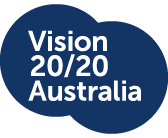MEDIA RELEASE
Vision 2020 Australia said the Government’s decision to break its promise to increase foreign aid funding to 0.5 per cent of GNI by 2015 was a setback for eye health.
CEO of Vision 2020 Australia, Jennifer Gersbeck, said the planned delay would significantly affect the lives of millions of people who were needlessly blind or vision impaired in the Asia Pacific.
“This budget is a real blow for the poorest of the poor,” Ms Gersbeck said.
“With 80 per cent of blindness and vision loss preventable or treatable the freeze on aid means that less people could have access to sight-restoring surgeries, eye screenings and the provision of spectacles,” she said.
Around 285 million people are blind or vision impaired. Some 90 per cent of these people live in developing countries and around half of blindness occurs in the Asia Pacific region.
Ms Gersbeck said she was deeply disappointed with the Government’s failure to deliver new eye funding to the Asia Pacific.
“People who are blind or vision impaired in the Asia Pacific are invisible in the pages of this budget,” she said.
Ms Gersbeck said as one of the richest countries in the world, we have a moral obligation to help those living in our region who are less fortunate.
“Every additional day a person is needlessly blind, you have to ask yourself the question why,” Ms Gersbeck said.
As part of Vision 2020 Australia’s Global Consortium – a partnership of nine leading eye health organisations – programs implemented over the past two years have transformed the lives of hundreds of thousands of people.
The Global Consortium has notably increased its impact on avoidable blindness and vision impairment conducting around 410,000 eye health screenings and over 75,000 eye surgeries since 2010.
Australian NGOs have provided training and skills ranging from Braille teaching to ophthalmology to over 7,800 professionals including doctors, nurses, village health workers and teachers across the Asia Pacific.
“These cost-effective treatments can be the difference between a life of poverty, and a fulfilling, healthy existence,” she said.
Ms Gersbeck said the deferment to boost foreign aid by a year to 2016 would potentially open the door for cuts in the future.
“If you can defer a promise, you can break it,” she said.
ENDS
Media Contact
Louise Rudzki, Media and PR Adviser, (03) 9656 2020, +61 414 784 359, lrudzki@vision2020australia.org.au
About Vision 2020 Australia Global Consortium
Australian NGOs have a long history of tackling avoidable blindness in developing countries. In 2007, recognising this expertise and the importance of eliminating avoidable blindness, a $45 million Avoidable Blindness Initiative (ABI) was announced to tackle blindness and vision impairment in the Asia Pacific.
Since then, Vision 2020 Australia’s Global Consortium, comprised of nine leading eye health agencies, has been launched, and a partnerships framework has been developed with AusAID to ensure effective implementation of Avoidable Blindness Initiative activities.
With funding from the ABI, the Global Consortium is tackling avoidable blindness on a number of fronts, including training eye nurses and eye doctors, developing systems to collect and utilise eye health data, strengthening eye health infrastructure (construction, renovation and provision of equipment), supporting the government's blindness prevention committee, and raising awareness of eye health and services.
Vision impairment is both a cause and a consequence of poverty, and tackling avoidable blindness enables people to return to work and contribute to their families and communities.
Eighty per cent of all blindness is preventable and treatable, and research has shown that interventions to improve eye health are essential in reducing poverty and achieving the Millennium Development Goals.
The Global Consortium is working in seven countries across the Asia Pacific to eliminate avoidable blindness. Since its implementation in 2010, the Consortium has seen the lives of thousands transformed.
About Vision 2020 Australia
Vision 2020 Australia is the umbrella organisation for the eye health and vision care sector in Australia. Established in October 2000, Vision 2020 Australia is part of VISION 2020: The Right to Sight, a global initiative of the World Health Organisation and the International Agency for the Prevention of Blindness.
Vision 2020 Australia represents over 60 member organisations involved in: local and global eye care; health promotion; low vision support; vision rehabilitation; eye research; professional assistance and community support.
